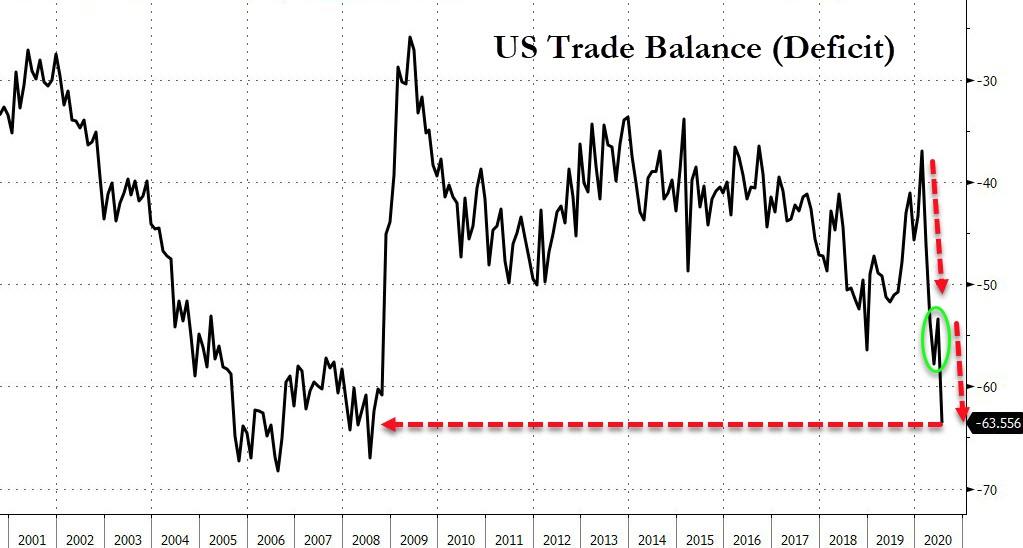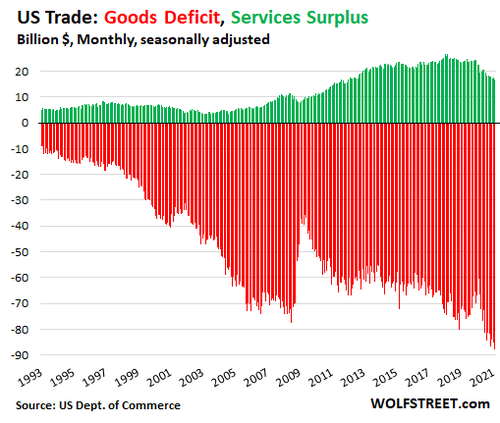Today, the trade deficit is growing and is bigger than ever. Those familiar with China and how it negotiates knew the Chinese would never agree to, or more importantly, honor any deal not strongly tilted in their favor. The events that unfolded and overshadowed the trade talks not only surrounded Covid-19 but more importantly how governments and central banks reacted to the pandemic. Here in America, a tsunami of freshly printed money was unleashed upon the masses creating the oddest recession in history. To be blunt, Americans saw their incomes soar while locked away in their homes and unable to attend work.
This of course resulted in consumers buying goods, many of them imported from China, rather than doing the right thing and paying obligations such as rent or mortgage payments. In fact, our government with little thought to the long-term ramifications, added fuel to this buying binge when it rapidly imposed a moratorium on evictions and foreclosures. This means we should expect the controversy over just how much trade contributes to America's economic growth to again rise as growth slows. Trade between countries is given far too much credit for being a big driver of our economy than it deserves and can actually become a drag.
The fact is if John needs to buy a wheelbarrow for work it does not matter where it is built. John needs and will buy a wheelbarrow. Where trade does fit into this has to do with what country employs workers to make that wheelbarrow and how much it will cost. While John may save money if the wheelbarrow was produced in a low-wage country trade has more to do with who benefits from commerce and should not be seen as a force driving us forward.
In many ways, trade should be seen as a way to increase access to a greater variety of goods at a better price but this only works over a long time if it is balanced. A county that constantly enjoys a trade surplus at the expense of its trade partners often reaches a position to exploit the weaker countries and generally does so. Throughout history, trade policies have had massive long-term ramifications on the strength of a nation's economy.
 With this in mind, Americans should be concerned the U.S. trade deficit jumped 18.9% in July of 2020
due to a leap in
imports. The trade gap increased to $63.6
billion from $53.5 billion in the prior month. Imports shot up 10.9%
while exports advanced 8.1%.
Because people tend to forget or brush aside the fact that for years
America has imported far more than it exports, this is not good news.
With this in mind, Americans should be concerned the U.S. trade deficit jumped 18.9% in July of 2020
due to a leap in
imports. The trade gap increased to $63.6
billion from $53.5 billion in the prior month. Imports shot up 10.9%
while exports advanced 8.1%.
Because people tend to forget or brush aside the fact that for years
America has imported far more than it exports, this is not good news.
The increase in both imports and exports was at the time promoted as a
good sign saying it pointed to stronger consumer spending at home and
increased demand for
American-made goods abroad. In the shall we say, excitement, what few people wanted to talk about was that according to Commerce
Department this number was notably worse than the expected deficit of $58 billion and is the widest trade deficit since 2008 when Americas pulled back on spending and fell into a funk.
Critics
of America's existing
trade policy say trade
deals over the years have failed to deliver on what they promised.
Instead, they have added to environmental problems across the
world and
exacerbated economic inequality within many economies as
manufacturing jobs have been outsourced to low-wage countries. Some
activists also claim these deals can curb freedom of
speech on the internet and other detractors say it incentivizes currency
manipulation.
When viewing the global economy we should consider that much of the "free trade" movement has been fueled by the mega-companies desire for larger markets and greed. The desire of big businesses to both develop and control future rules has caused them to lobby governments into giving up control and becoming subservient to corporate “efficiency.”
The promise that
increased trade will
create new jobs has turned out to be largely a
myth. History has shown that trade agreements with low-wage nations are not the great job creators we have been told. The idea trade is a huge benefit to the masses flows from large multinational companies that have the most to gain. It
is difficult to deny that in our modern world these large companies
already have more power than most nations and their power continues to
grow at an alarming rate.
It would be fair to say that not everyone was a fan of Trump's trade war strategy or that it was well executed. This included many of America's mega-companies that moved production overseas years ago to exploit cheap labor. Several of these mega-companies opposed any policy that would harm their profits. Putting their interest before America, such companies and their lobbyists mounted a well-funded propaganda campaign against the trade talks based on the idea consumers will be forced to pay higher prices which would hurt the poor.
 |
| This Brings Us To The Magnificent Chart Above Which Shows The Growing Deficit |
Trade is not a big driver of the economy as often claimed, instead, it can greatly weaken a country sapping its strength. Trade benefits multinational companies. The money they wield has hijacked the conversation about how much benefit trade creates. I contend that trade shifts growth and jobs from one country to another rather than simply adding to growth in a substantial way. In many ways, the global economy has become an ill-regulated business model tilted to favor big businesses and giant conglomerates. This translates into the companies and their owners or shareholders benefiting far more than the economy in general. It is not difficult to make the argument this has been harmful to the smaller domestic companies that generate many jobs here in America, Apple is a prime example of this.
Circling back to the example of John and his wheelbarrow used at the
beginning of this article, it is wise to remember that the economic
cycle is rooted in reality.
John only needs so many wheelbarrows, when he has enough, he stops buying them until they are worn out and he needs more. Low-interest rates, super sales, and easy credit can only stimulate growth in these sales so much, and often it is at the cost of future sales.
As the economy slows and trade tensions rise expect more fingers to point at sagging trade as the culprit. The fact is, no matter what we have been told by those with an agenda, trade between countries is only a win-win if it is balanced. Also, it is not a big factor in producing quality and sustainable economic growth. Still, we hear the narrative spun by politicians playing the "fear card" with statements such as "We can’t let countries like China write the rules of the global economy.” This implies we will lose the power to control our own fate if we stand firm and refuse to embrace the wishes of large companies.
I am not alone in recognizing China's reliance on an age-old and tested Asian negotiation technique, call it a tactic or style if you like, but it is deeply rooted in wearing down your opponent over time. China intends to exploit the advantages a state-driven economy has over free enterprise while expanding its military armed with a slew of modern cutting-edge weapons. China is a state-run economy based on a business model that is geared to expand by crushing the competition. Subsidizing those companies working within its system in a multitude of ways helps it achieve this goal. China's practice of exporting goods at slightly below cost in exchange for manufacturing jobs is not stupid, it's predatory and we are its prey.
(Republishing of this article welcomed with reference to Bruce Wilds/AdvancingTime Blog)


Good analysis. When i grew up (60s) most of the items in the house had Made in USA on them. Appliances, sheets/towels, stereo, TV, even sneakers and most of the clothes etc. The wave of imports from Japan, Hong Kong followed by Taiwan, Korean and finally China as well as other south Asian countries grew and grew. (There was always a deficit with Germany and several European countries too). The cost of millions of lost jobs, countless vanished industries/factories + support services,depressed communities, and lost tax revenue etc. is incalculable. This hollowing out of industry was accompanied by a vast expansion of the welfare state. The rise of trade deficits accompanied the growth in fiscal deficits and are Siamese twins to a great extent. Only now the trillions in govt debt and Fed money "creation" dwarfs the trade deficit. The US is a consumer economy and consumes to a large extent imports. It augurs ill for the future esp. the dollar.
ReplyDeleteGlen, I got your message about being unable to comment. Thanks for the comment and I wanted to let you know it now appears under the article. It was approved and posted yesterday. The must-be-approved feature became necessary to keep spammers from across the world from advertising all kinds of garbage and services.
DeleteWhile you mentioned how Germany has withstood the Chinese/Asian export onslaught a lot better than the US, I'm afraid the EU is about to see its trade deficit with China soar. This is noted in the article below.
https://brucewilds.blogspot.com/2021/01/the-eu-is-at-risk-of-becoming.html